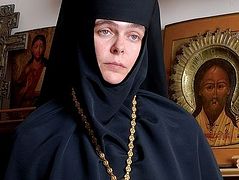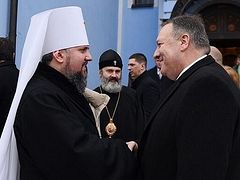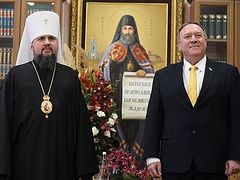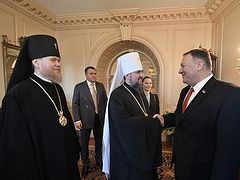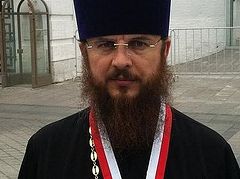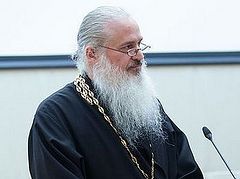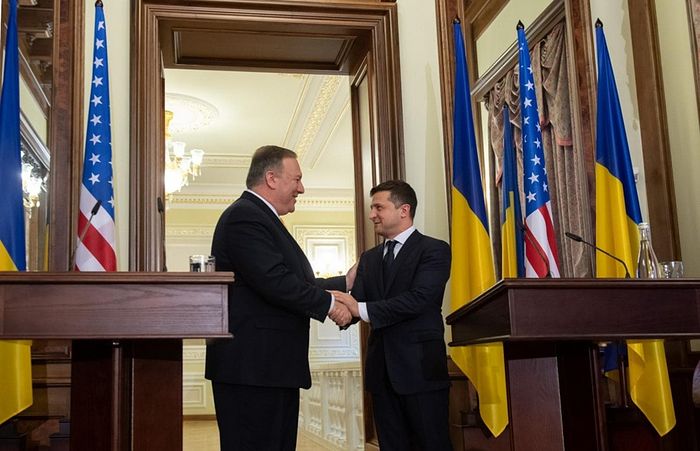 Mike Pompeo and Volodymyr Zelensky
Mike Pompeo and Volodymyr Zelensky
On January 31, the US Secretary of State Mike Pompeo visited Kiev, and met with the President of Ukraine Volodymyr Zelensky, and the head of the [schismatic] Orthodox Church of Ukraine (OCU), Metropolitan Epiphany Dumenko. This meeting took place against the backdrop of a calm on the Ukrainian church front: the number of seizures of churches by schismatics decreased, Epiphany stopped making inflammatory statements and calling for the "return" of the Lavras for a while. The Ukrainian Orthodox people even began to say that the OCU isn’t acting the same. But Pompeo’s visit could mean a powerful signal for a return to Poroshenko’s politics on the church issue.
With the coming to power of Volodymyr Zelensky, the church issue in Ukraine has ceased to be so acute—the young president is trying to refrain from making sharp statements about the church situation in Ukraine. But not everyone in his team shares Zelensky’s restraint. For example, Minister of Culture Vladimir Borodyansky is a protege of supporters of the American billionaire George Soros, who is now actively promoting his interests in Ukraine. Soros has a network of various public organizations, and through them he can advance his interests. And in the current Ukrainian government, “Sorosists” play a not insignificant role.
Supporters of George Soros—“Sorosists”—are essentially representatives of various public organizations [often NGOs] operating in Ukraine. Most of them are younger people, quite successful, who have participated in many seminars. They are now connected with the Ukrainian authorities, and they dictate the general course of the movement of Ukraine. They also determine the [political] attitude of Ukraine to the Church.
The visit of Pompeo is, in fact, the strongest signal for George Soros’s people. After all, even though the Secretary of State is part of Trump’s team, that is to say, the Republicans, a group hostile to Democrats, which includes Soros, Pompeo is still working for the “system”, which equally corrals and herds both donkeys and elephants. And his meeting with Epiphany is a strong signal for pro-American [Ukrainian] officials as to which [ecclesiastical] camp the US State Department is sponsoring.
During a meeting with Zelensky, Pompeo thanked the Church of Greece for recognizing the schismatics of the OCU, and regarding the recognition of schismatics by other Local Churches, he said: "Russia should not stand in the way."
In addition, Pompeo met with the "Metropolitan" Epiphany and noted [that he is] “very pleased [the] Greek and Alexandrian Churches recognized the Orthodox Church of Ukraine as autocephalous. Russia should never be an obstacle to protecting the fundamental rights of Ukrainians.” BBC Ukraine reported that during a meeting with Dumenko, Pompeo said that their conversation was needed so that “Russia's influence in Ukraine would not be so strong.”
The same publication notes that this is the second meeting of Dumenko with the US Secretary of State—earlier, in October 2019, he met with Pompeo in Washington. The Secretary of State previously held a personal meeting with the "Metropolitan"—even the President of Ukraine Zelensky did not receive such attention from the senior American official.
By the way, for the sake of meeting with Dumenko, Pompeo at the last moment canceled the meeting with the Head of the Department for External Church Relations of the Russian Orthodox Church, Metropolitan Hilarion. After a frustrated meeting, His Eminence said in an interview:
“In October, a date was found to suit both me and the secretary of state. […] But an hour before the appointed time a call came to say that instead of the secretary of state I would be received by his deputy. I would not meet with a deputy. I do not doubt that after the secretary of State’s schedule was published, our ill-wishers in America took steps to prevent his meeting with me. There are persons and structures that are concerned to ensure that the secretary of state and generally the American leadership always hear only one side and have no opportunity to hear the other.”1
How exactly Vladyka would be able to convince an obvious enemy of Orthodoxy and the Russian Orthodox Church is uncertain.
Pompeo’s visit was preceded by a series of events, among which the most striking was Zelensky’s behavior in Poland. Speaking with Polish President Andrzej Duda, Zelensky indirectly blamed the USSR [for] the beginning of the Holocaust:
“Poland and the Polish people were the first to feel the collusion of totalitarian regimes. This led to the outbreak of World War II and allowed the Nazis to launch the deadly Holocaust machine.”
Zelensky said this, absolutely not understanding how these words would be perceived by Russia and the part of the [Ukrainian] electorate which advocates reconciliation with Russia.
After these words of Zelensky some stories arose that the Poles had slipped him a piece of paper with the speech. However, this is not so, a source close to the Ukrainian authorities told our publication:
“He wanted to please Duda, so he said what he said. Zelensky absolutely does not think about the consequences of his words, or in general about the current political situation.”
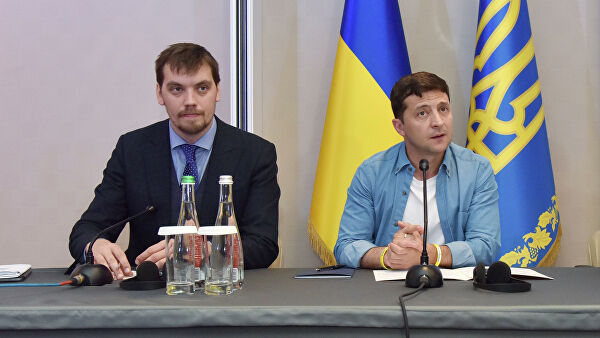 Alexey Goncharuk and Volodymyr Zelensky
Alexey Goncharuk and Volodymyr Zelensky
Another important event indirectly related to the church situation in Ukraine is a filmed scandal surrounding the Prime Minister of Ukraine Alexey Goncharuk. Records of the Prime Minister’s conversation with ministers on the eve of the meeting with Zelensky appeared on the Internet. Judging by the leaked conversation, Ukrainian officials were deciding how to spin the economic situation to the president so that he would come away with a positive impression; that is to say, they were planning to deceive the head of state:
“He needs to be told: look, Vlad. About the [growth] rate, the fact is just that next year’s Olivier salad2 on the New Year’s table won’t be more expensive than this year.” And further [they said]: “Zelensky has a very primitive understanding of economic processes. More precisely, a simpleton’s understanding.” In addition, the prime minister himself admits that he is uneducated in economics: “I am a complete ignoramus in economics—I am a lawyer by training. But what do I understand? There are two economic theories—Monetarism and Keynesian. You are going down the path to cheapening resources. And you are going the way of printing money, that’s how you’re developing the economy.”
After such statements, everyone expected Zelensky to fire Goncharuk, since the prime minister does not enjoy great sympathy among Ukrainians. But that did not happen. According to the head of a faction of the “Servant of the People” party in the Verkhovna Rada, David Arachamia, this issue was not even discussed. Yet it’s obvious that retaining an individual who was permitted to speak so dismissively towards the President is a blow to the rating of the head of the country.
“Goncharuk cannot be fired—after the adoption of the government program, he has immunity from dismissal until the fall of 2020. He can only be pressured to leave of his own will. But this is difficult to do, because Goncharuk supports the West and the IMF. And paradoxically, the attacks on the Prime Minister by the Kolomoisky group only increase his weight in the eyes of the Western embassies, making him appear to be a fighter against the oligarchs.” A source in the Ukrainian government told the publication “Strana”.
The two examples above suggest that Ukraine is slowly but surely losing all signs of sovereignty, no matter how consequential it may sound. And no matter how strange it may be, in the political aspect, Poroshenko was a more sovereign president than Zelensky—he had a team under his control, he defended his supporters from American expansion (the story of the dismissal of ex-Prosecutor General of Ukraine Viktor Shokin, who resigned only after direct public directions from Washington). Of course, Poroshenko was an enemy of the Church, but this was his personal position. But Zelensky does not have his own position, his team is weak, and he himself cannot defend his position, primarily in front of the United States.
“Pinchuk [a Ukrainian oligarch closely connected with the American Democrats and Soros’s structures] received the most from Zelensky’s victory, who was able to introduce “Sorosists” into the Ukrainian government, not only at the highest levels, but also at the middle management level,” said a source close to the highest echelons of Ukrainian power. “And this group works exclusively under the USA. They work situationally under anyone convenient, but if there is a clear directive, they obey Washington. Here is an example: Zelensky wanted to make Ivan Bakanov the head of the Office of the President; he is a parishioner of the UOC and holds generally normal views, but the Sorosists sounded the horn, and Andrei Bogdan entered the office. And Bakanov is in isolation in the Security Service of Ukraine, he does not have his own team, especially with such specific competencies. He is a normal person, but cannot do anything at his post. Now we are waiting for an attack on the speaker, Razumkov—Sorosists will pick off Zelensky’s team one by one.”
Although the US Presidency is currently being held by a member of the anti-Democrat camp—the conservative Donald Trump—the Secretary of State is a man of “the system”, who listens to both camps.
“Pompeo is a man of the system, not one of Trump’s men,” says the source in the Ukrainian government. “He carefully avoids talking about Biden and tries to remain neutral. Democrats and Republicans have a consensus on Ukraine: Democrats see Ukraine as an anti-Russian civilization, while Republicans have a simpler view, which allows them to influence and bargain with the Russian Federation. It’s just that the Democrats have a more complicated concept, ideology and even metaphysics, like some kind of ‟Anti-Russia.” But both Republicans and Democrats see Ukraine as a way of influencing Russia, and none of them will simply refuse. It’s not profitable".
According to the source, Pompeo’s interest in the OCU project is not accidental—the Secretary of State is considered to be interested in religion, he has connections with the Greek diaspora in the USA:
“Pompeo positions himself as a believer, Church is interesting to him. And he acts within the logical framework of the system that launched the project to create schism in the UOC and create the OCU for influence against Russia, even if Pompeo does not share the views of the Democrats. The OCU project offers many opportunities in and outside Ukraine: you can negotiate with Poroshenko through Dumenko without irritating Zelensky, you can influence Russia by increasing or easing pressure on the UOC, and through it, on the Russian Orthodox Church and Patriarch Kirill.”
The source in the Ukrainian government also shared his vision of the project of world Orthodoxy under American influence.
“The new Orthodoxy would be controlled by the United States, in favor of the dictatorship of one person, who is easier to control than 15 Primates. It’s easier to “steer” one Bartholomew or his successor, than many Primates, each of whom is to some extent dependent on the power of his country, and also has his own opinions.”
Thus, the visit of Pompeo to Kiev is a powerful signal for American henchmen in Kiev as to whose benefit they must work. And if the new president Zelensky tried to distance himself from church conflicts and the support of Dumenko, it is obvious that the “Sorosists” clearly mandated which of the faith organizations should be supported.
In general, the further travels of Pompeo are noteworthy: after Kiev he went to Minsk, where he talked with the President of Belarus, Alexander Lukashenko, and promised to help him with the search for an alternative to Russian oil. The meeting with the head of Belarus was held against the backdrop of deteriorating relations with Russia, due to an unresolved conflict over the cost of oil and gas. Then Pompeo visited Kazakhstan, who promised to help Belarus with oil supplies instead of Russia. The Secretary of State also visited Tajikistan, which recently stated that it would limit itself to observer status in the Eurasian Economic Union’s Russian integration project. All this resembles an attempt to create a kind of “anti-Russian arc” among Moscow’s closest neighbors and even allies. It is obvious that in this project, the church issue will be one of the most important.
Therefore, hopes that with Zelensky’s coming to power the church saga in Ukraine would end, most likely, will disappear. And faithful Christians of the Ukrainian Orthodox Church will face new challenges.

